50 Years On, A Seminal Work Is Alive and Debated
More than fifty years after its publication, Hannah Arendt's Eichmann In Jerusalem is as relevant and controversial as ever. During a standing room only event, a distinguished panel and members of the audience debated its journalistic and philosophical merits at the Columbia Journalism School. Includes full video.
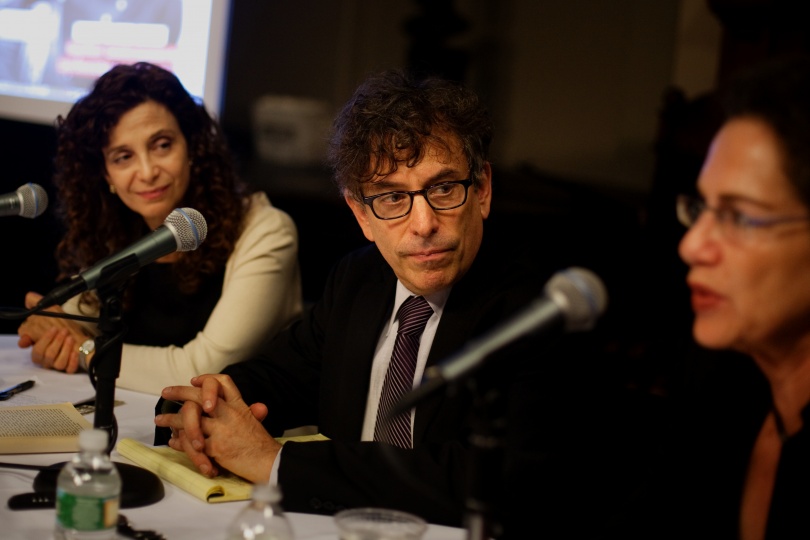
“Beth Hamishpath – the House of Justice: These words shouted by the court usher at the top of his voice make us jump to our feet as they announce the arrival of the three judges, who, bareheaded, in black robes, walk into the courtroom from a side room to take their seats on the highest tier of the raised platform.”
So begins Hannah Arendt’s Eichmann in Jerusalem, a book originally published in 1963 as a series of articles in The New Yorker magazine, centered on Adolph Eichman’s war crimes trial for his role in the Holocaust. At a standing room-only event in the World Room at Columbia Journalism School last week, Dart Center Executive Director Bruce Shapiro read those lines, calling the book “a still controversial and potent thesis about the banality of evil and complicity, and how large scale evil happens.”
Click below to watch the event video:
On the 50th anniversary of the book’s publication, the Dart Center hosted a lively forum with Pulitzer Prize-winning author and human rights journalist, Tina Rosenberg, and moral philosopher and Einstein Forum director, Susan Neiman. The discussion ranged from journalistic lessons derived from Arendt’s work to debate about the moral and philosophical questions posed by the book, which Arendt subtitled with the chilling phrase, “the banality of evil.”
Shapiro, who moderated the event, set the tone for the evening by telling the audience, “Think of yourselves in a café in 1963, in Jerusalem or Berlin,” and the panelists and audience seemed to follow, offering up strong and often divergent opinions.
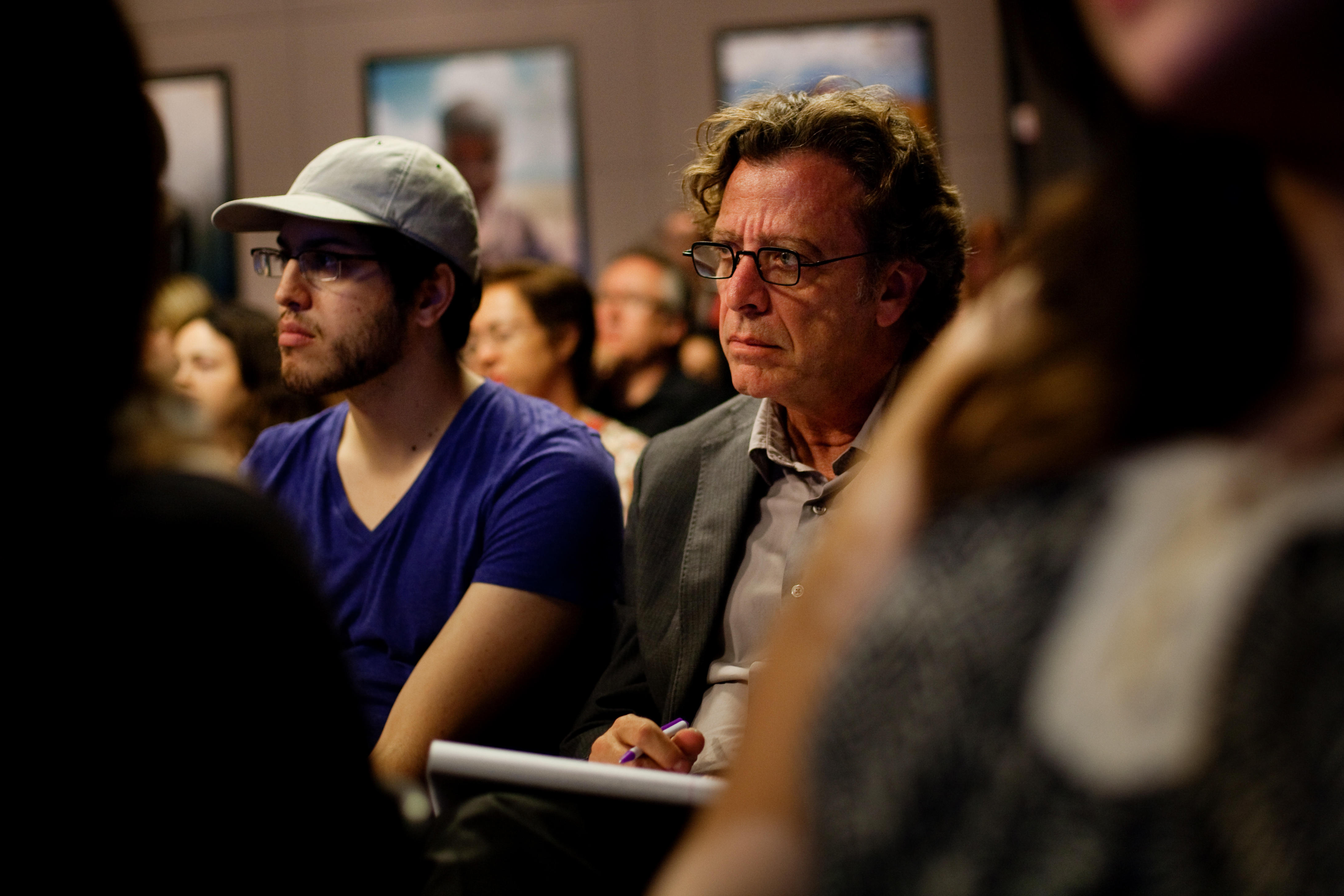
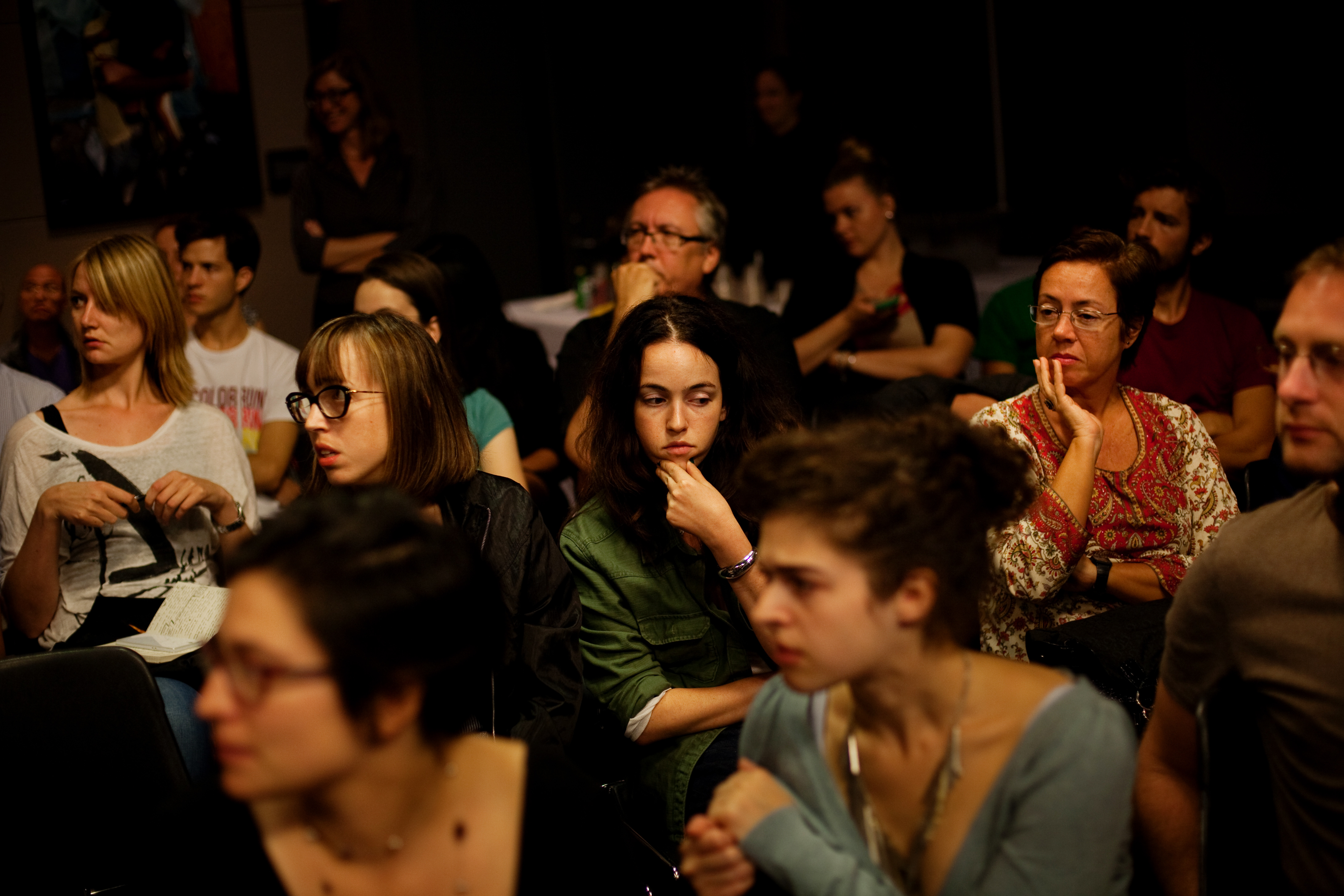
Members of the audience, including psychologist Jack Saul (above), look on. (Alan Chin)
The book’s central thesis on the banality of evil expounds on the “just following orders” mentality of those responsible for and complicit in implementing bureaucratically orchestrated violence. Rosenberg said the book heavily influenced both her writing method and her decision to make the question of conscience and morality the heart of her work. Arendt’s brazenness and originality gave Rosenberg permission to push herself beyond conventional journalism in her books, including Children of Cain, Join the Club, and Haunted Land, which won the Pulitzer Prize and National Book Award for Non-fiction. “I loved the idea that she [Arendt] didn’t have to accept what anyone else was saying,” Rosenberg said.
Neiman noted that she read Eichmann in Jerusalem while sick in bed during graduate school as a bit of light reading. For her, the book represented “someone doing philosophy the way that it should be done. It was a more conceptually interesting and rigorous way than the existentialist way. It was someone talking about the most important political and moral issues of the 21st century.” Both participants noted Arendt’s untraditional tone, which bordered on irony and dark comedy, and which has drawn criticism. “I think the tone is important and we should defend it,” Neiman said, noting with wonder that Arendt pulled it off despite that “English was her fifth language.”
.jpg) The question of whether Arendt’s notion of the banality of evil still held was one that Neiman had recently changed her opinion about. She cited a new book published in German, which discovered that Eichmann “wrote himself about philosophy - it's not good philosophy. But he actually sits and thinks about ‘Well, what about morality? Well, which morality shall we take?' So, we cannot any longer defend the banality of Eichmann. It's the first time that I had to revise something that I'd thought about for 20 years.”
The question of whether Arendt’s notion of the banality of evil still held was one that Neiman had recently changed her opinion about. She cited a new book published in German, which discovered that Eichmann “wrote himself about philosophy - it's not good philosophy. But he actually sits and thinks about ‘Well, what about morality? Well, which morality shall we take?' So, we cannot any longer defend the banality of Eichmann. It's the first time that I had to revise something that I'd thought about for 20 years.”
Rosenberg wasn’t convinced. She said, “All I can say is the banality of evil still held in Chile,” where her first book, Children of Cain, was based and where she found people who defended the Chilean leader Augusto Pinochet “up till the end.” She said it was only his corruption that convinced some citizens of his criminality. In the case of Pinochet, like in the case of Eichmann, it was in part the structuring of the system that allowed for this normalization of evil. Rosenberg said, “The reason Eichmann was banal was because he was living in a society where that way of thinking was considered normal, and that goes back to the idea of the government creating a situation where that atrocity was possible.”
Neiman said she believed there were still some places where the banality of evil seems to apply. “It still holds in Germany and it still holds in this country,” she said. She used as an example the failure of the American people to protest the Supreme Court decision in the Citizens United case, which upheld as a First Amendment right the privilege of corporations, organizations and unions to fund political campaigns. Rosenberg countered, saying the example did not suggest to her “citizen complicity.” Later, during a heated question and answer session, Neiman’s example was at the heart of a comment by a lawyer in the audience, who pointed out that the man who argued the case on behalf of Citizens United was the same attorney who represented The New York Times in the landmark First Amendment case known as the Pentagon Papers.
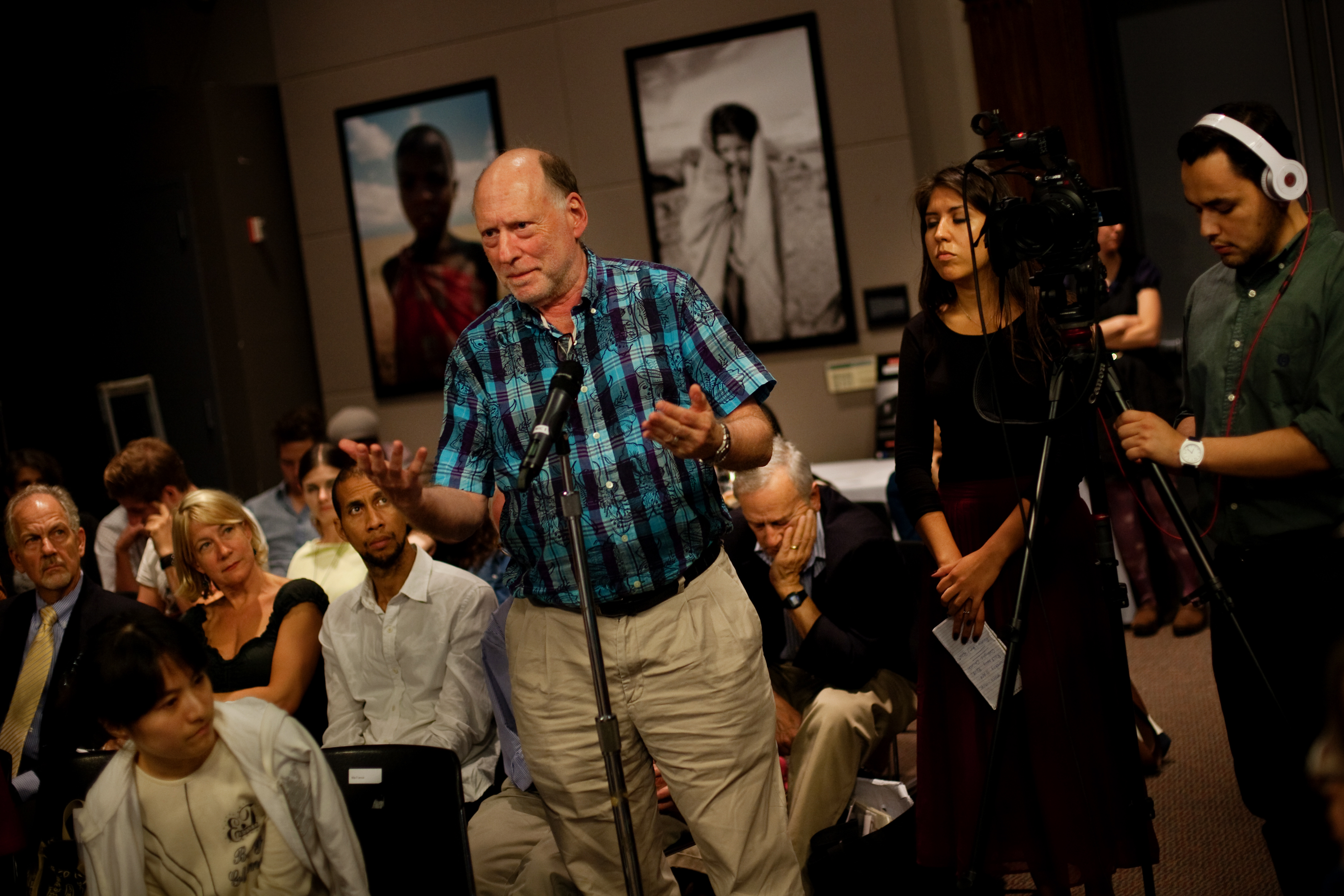
Columbia Journalism Professor Todd Gitlin asks a question of the panel. (Alan Chin)
During the panel, Neiman said Arendt’s book addressed “our fascination with evil.” “She wanted Eichmann to be a clown,” Neiman said. “She wanted people to figure out that this wasn’t some evil Lucifer, but a fungus. Fungus isn’t sexy, whereas grand, powerful Lucifers are attractive, and people get attracted to them.”
In her work, Rosenberg has posited the idea of “the little war criminal inside all of us.” Neiman argued that for Arendt, the important moral distinction was the actualization of being a criminal, and not just the possibility.
Drawing attention to the book’s significance to the work of the Dart Center, Shapiro noted that while Eichmann in Jerusalem focuses on legal justice, ultimately the trial was not about justice, but an attempt at catharsis for the victims. That was something journalists can have a part in. “For many large and small atrocities, there will never really be effective legal justice, but the role of journalists can be to provide narrative justice, which deals with the mess of the accountable, the colluding.”
Still, even covering such events can be trying. When Shapiro asked Rosenberg what was next for her, she answered, “I’m kind of burned out.”
Neiman felt similarly. “I could say with Tina that I burned out after a while,” Neiman said, adding, “There’s something unhealthy about our fascination with evil.”
But in fact both remain determined. Rosenberg and her writing partner at The New York Times have a vision of a new paradigm for journalism, one that is gaining traction as the field is undergoing transformation. Currently, she said, journalists “write about problems and assume someone else is going to change them. But society does better when they see some examples of how it can be done.”
Neiman ended on a hopeful note as well. “If we don’t remember that we actually have made some progress in the world, we won’t be able to make more.”
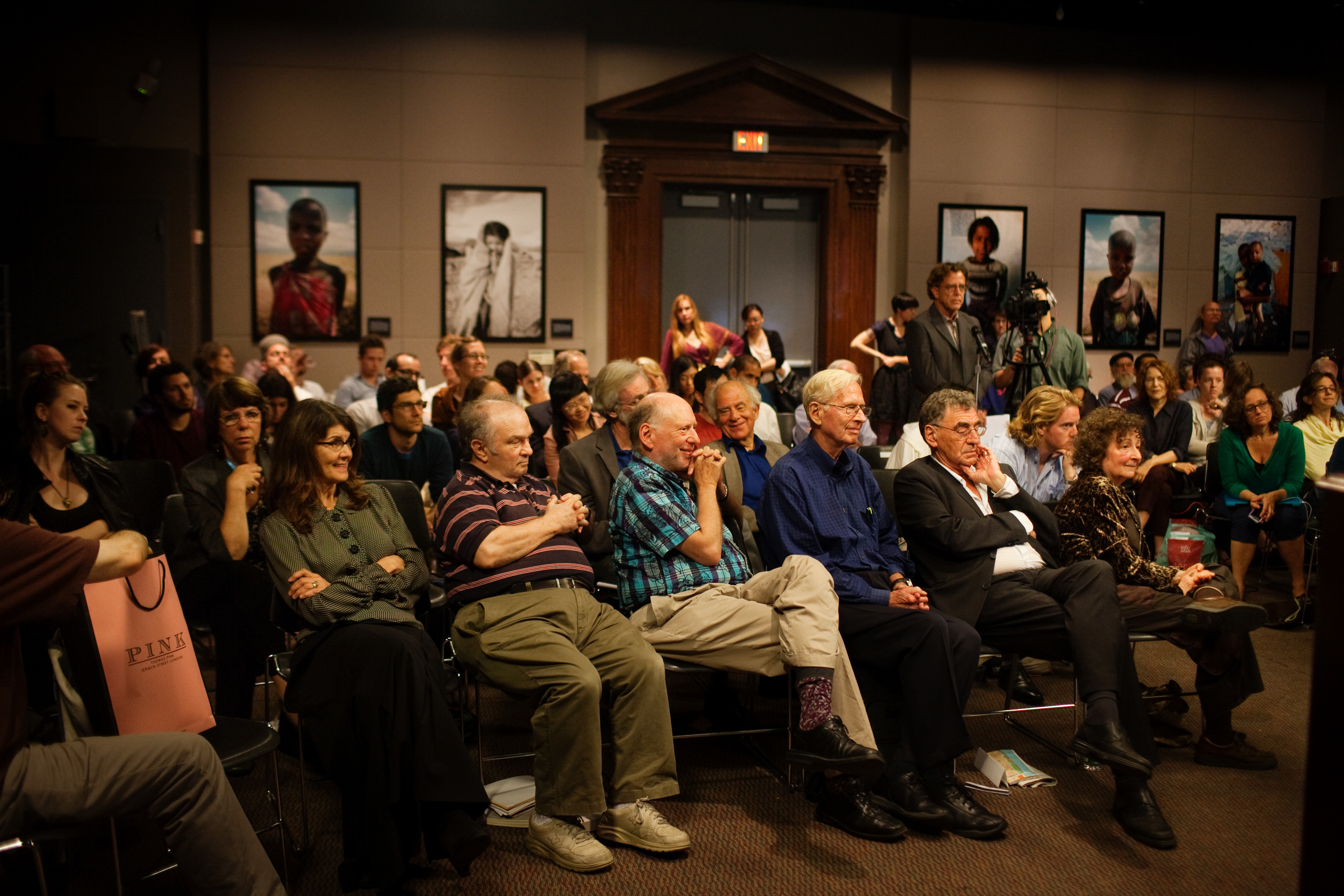
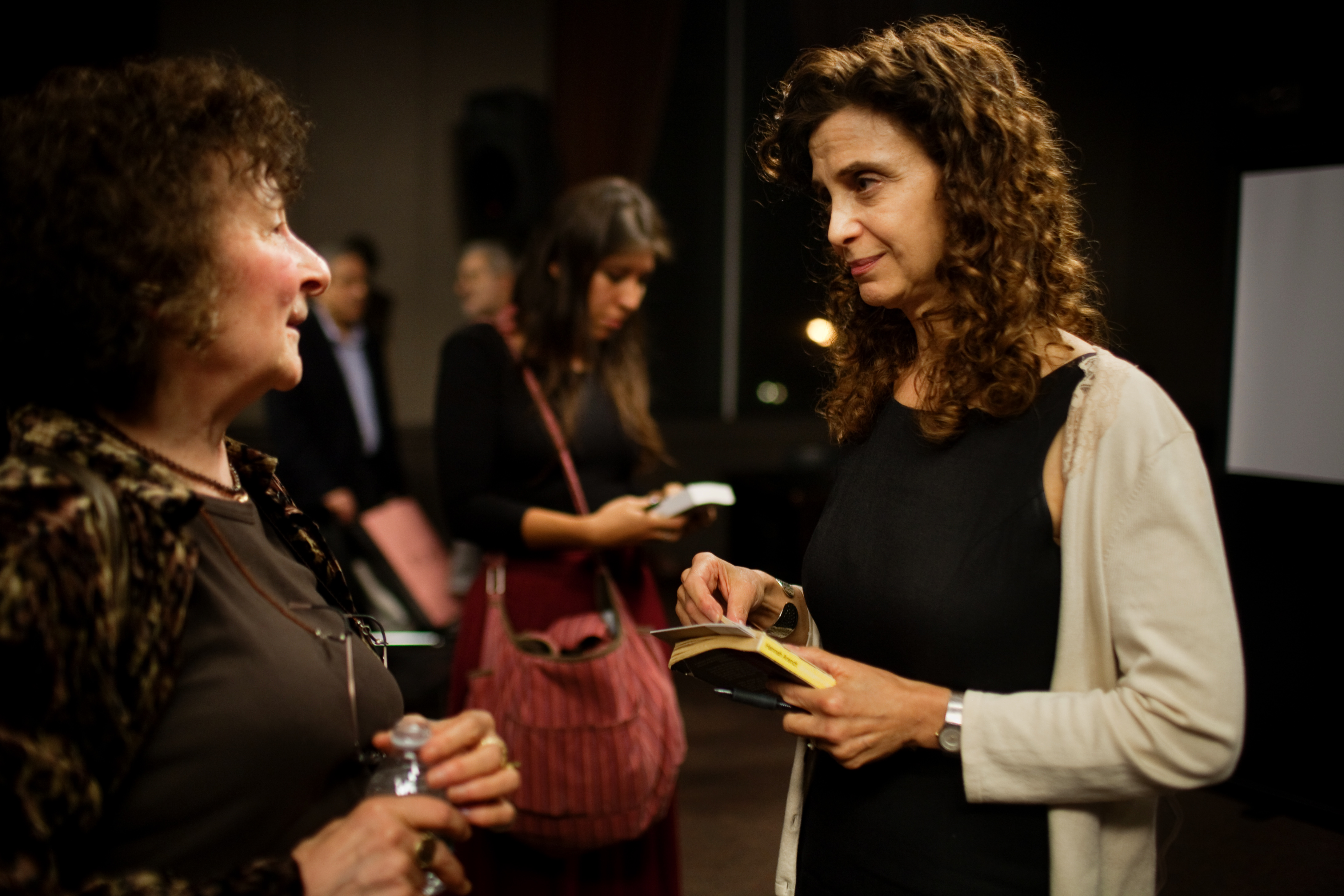
Tina Rosenberg continues the conversation afterward. (Alan Chin)
































































































